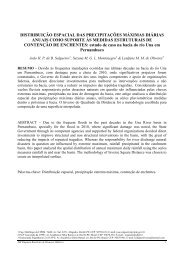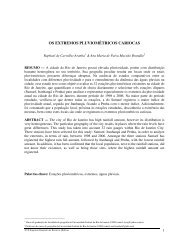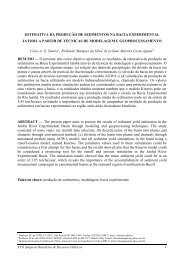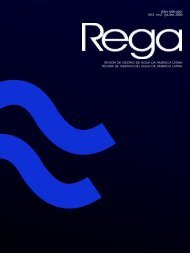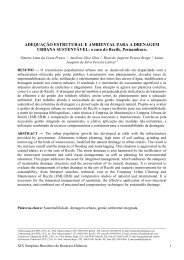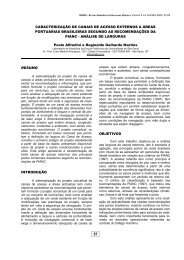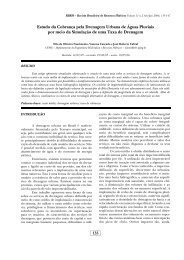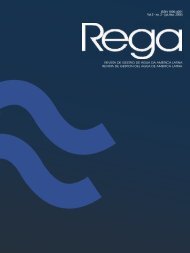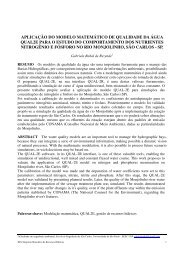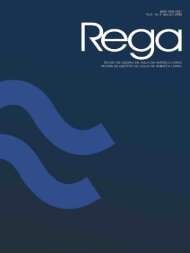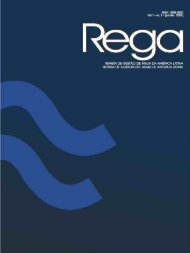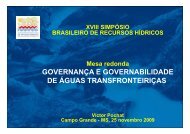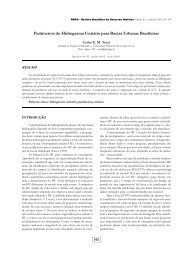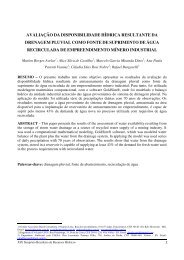REGA – Vol. 1, no. 1, p. 37-46, jan./jun. 200444subject to double regulation, due to itspublic character 8 .- In the National Plan for Water and Sanitation(2001 – 2010), it has been establishedthat SEMAPA has to increasethe coverage from 58% to 90%, mostlythrough the use of new sources likeMisicuni (30% of the drinking watercomponent cost being financed bySEMAPA); increase the sanitation coveragefrom 55% to 70% and to improvethe network and control leakage.- There are also attempts to create a metropolitanarea (joining various municipalitiesnear Cochabamba city) that accordingto the Plan would be managedby SEMAPA under an operation contract.- In order to do all this, recently SEMA-PA has obtained a credit of US$3.9 millionfrom the IADB through the RegionalDevelopment National Fund (FNDR)to implement a project to expand watersupply, study a minimum cost solutionfor sewage treatment and begin a programof institutional development forthe company. Another US$13 million isexpected to be invested once the firstphase of the project is concluded.Another battle in this war will still befought at the International Court on Controversiesand Investments (CIADI) inThe Hague, where the Consortium haspresented a lawsuit for 25 million dollarsas indemnity for breach of Contract 9 . Thecase is going to be resolved by a secretcourt and according to the regular procedureis going to be kept under secrecy.Finally, although demonstrations initiatedmainly from the organization ofregantes (users of water for irrigation) andsmall drinking water systems to defendtheir rights over the water sources thatthey currently use, these rights are stillnot secure as the regulations that wouldallow their legal recognition have not yetbeen approved.CONCLUSIONS: LESSONS LEARNTAND THEIR APPLICABILITY ELSEWHEREThe main conclusions and lessons that canbe learnt from these experiences relate to bothwater resources, and to the provision of waterand sanitation services:With regards to water resources, the Cochabambaexperience shows:How difficult it is to formulate and implementpolicies and legislation on water resourcesmanagement from upper levels(top-down) in a context like Bolivia wherethere has been, for a long time, an autonomousadministration of resources bypeasant communities and social organizationsbased upon what they call “customsand traditions” i.e. rules defined and legitimisedby local communities.8We consider that there is a “double” regulation because, thecompany has to follow the procedures established for thepublic sector regarding management, acquisitions, contracts,etc. so is being regulated in that way and at the same timebecause it has a Concession, has to be also regulated by theSuperintendency of Basic Sanitation (SISAB) under proceduresthat are designed to regulate private companies.9As soon as the presentation of a lawsuit by the companyAguas del Tunari was known, a coalition of several groupswas organised, with the aim of lodging complaints before differentbodies. Members of this coalition include the Coordinadoradel Agua y de la Vida, the Federacion de <strong>Rega</strong>ntesand the Fundacion Solon (Solon Foundation) in Bolivia; theDemocracy Center, Public Citizen, International Forum onGlobalisation, Global Exchange and the Institute for PolicyStudies in USA; and X Minus Y in Holland.On 1st July 2002, this coalition obtained its first victory in theUSA. The Directing Board of Supervisors of San Francisco(the highest authority of the municipal government of SanFrancisco, California), approved a Resolution demanding thatthe Corporation Bechtel “immediately withdraw its punitivelegal lawsuit in the international courts against Bolivia and itspeople, and refrain from initiating any other litigation or lawsuitof mediation – in or out of the EEUU borders- against thatSouth American country”. Resolution of the The DirectingBoard of Supervisors of San Francisco, 1st July 2002).On 29 August 2002, several non-governmental organisationssent a letter to the World Bank Group, demanding public accessto the proceedings at ICSID. They are still awaiting a responsefrom this entity, but in a similar previous case, the Courtrejected a legal action against the Federal Government of Tucuman,Argentina that had been filed by another internationalcompany. The Bolivian government has hired a law firm to defendits case, but little information is being made public.
Bustamante, R.The water war: resistance against privatisation of water in Cochabamba, BoliviaThat organisations and the movementrepresenting civil society expressed a totalrejection, during the water war, of theprivatisation of water resources. Theywere against any individual or collectiveappropriation that would allow commercialtransactions of a natural element,which for the local culture is even consideredto be a live being. Both in ruraland urban areas, water was defended asa common good for which managementshould be collective.Finally, that it is not possible to regulatethe use and exploitation of water resourcewith sector-related legislation alone. Thisis and has been attempted in other sectorslike the mining sector, the hydro-electricalsector, and others. That is one of thereasons why it is not possible yet to approvea new Water Law in the country, regardlessthe process started in the 70’s and thatby the year 2000 ended up with 32 differentproposals. That is why the Boliviangovernment is trying to open the discussionsabout a new legislation, but startingfirst with the definition of a national waterpolicy that should be agreed upon ina participative process.<strong>Rega</strong>rding the provision of the drinkingwater and sewage services, we should make severalconclusions:Some basic assumptions of privatisationshould be questioned and qualified. Forexample, it is evident that the participationin reformed service provisionshould not be limited exclusively to privateenterprises, but it should considerother organised bodies, such as the cooperativemovement and other communitybodies as well as possibilities for cooperationbetween the public and theprivate sector.Exceptions to the principle of “full-costrecovery” and a more flexible approachmust be considered in some cases, especiallyin poor countries like Bolivia, wherepublic investment through subsidies andother forms of assistance are necessary.The regulation of the services is an importantissue. Regulations need to bestrengthened and made more efficientas the first step in any privatisation. If thisis not the case, companies will take advantageof the weaknesses of governmentagainst the interests of consumers. It isnecessary to create mechanisms of socialcontrol that allow for more transparency,and therefore less corruption in theregulation of basic services.It is evident that social participation, publicaccess to information, and transparencyin the administration of services andresources are fundamental. The exclusionof the population from the decisionmakingprocess creates a basis for theemergence of problems and conflicts.The constructive participation of everyone,not only a few, in reform processesmust be attempted. In this sense, laws andpolicies should be a social creation andin their elaboration the participation ofthe population should be considered.This is even more important when resourcesand services that are essential forlife and health are at stake.Finally, it is worth investing time, effortand resources in processes of dialogueand agreement as a way of avoiding conflictswhose social and economic costs areincalculable.45ReferencesASSIES, W. 2001. David vs. Goliat en Cochabamba: los derechos del agua, el neoliberalismo y la renovación de la propuesta social enBolivia. T’inkazos, La Paz, v.4, n.8, p.106-134.BOLIVIA. 1999. Ley de servicios de agua potable y alcantarillado sanitario (ley 2029). Gaceta Oficial de Bolivia, La Paz.BUSTAMANTE, R. 2000a. El difícil camino de la formulación de una nueva Ley de Aguas para Bolivia. Conferencia presentada en elSeminario Taller del Foro Público, Cochabamba, 23-24 feb.BUSTAMANTE, R. 2000b. Apuntes jurídicos sobre el caso “Aguas del Tunari”. http://www.aguabolivia.org
- Page 2 and 3: REVISTA DE GESTÃO DE ÁGUA DA AMÉ
- Page 4 and 5: ○ ○ ○ ○ ○ ○ ○ ○ ○
- Page 6 and 7: REGA - Vol. 1, no. 1, p. 5-20, jan.
- Page 8 and 9: REGA - Vol. 1, no. 1, p. 5-20, jan.
- Page 10 and 11: REGA - Vol. 1, no. 1, p. 5-20, jan.
- Page 12 and 13: REGA - Vol. 1, no. 1, p. 5-20, jan.
- Page 14 and 15: REGA - Vol. 1, no. 1, p. 5-20, jan.
- Page 16 and 17: REGA - Vol. 1, no. 1, p. 5-20, jan.
- Page 18 and 19: REGA - Vol. 1, no. 1, p. 5-20, jan.
- Page 20 and 21: REGA - Vol. 1, no. 1, p. 5-20, jan.
- Page 22 and 23: REGA - Vol. 1, no. 1, p. 21-35, jan
- Page 24 and 25: REGA - Vol. 1, no. 1, p. 21-35, jan
- Page 26 and 27: REGA - Vol. 1, no. 1, p. 21-35, jan
- Page 28 and 29: REGA - Vol. 1, no. 1, p. 21-35, jan
- Page 30 and 31: REGA - Vol. 1, no. 1, p. 21-35, jan
- Page 32 and 33: REGA - Vol. 1, no. 1, p. 21-35, jan
- Page 34 and 35: REGA - Vol. 1, no. 1, p. 21-35, jan
- Page 37 and 38: The water war: resistance against p
- Page 39 and 40: Bustamante, R.The water war: resist
- Page 41 and 42: Bustamante, R.The water war: resist
- Page 43: Bustamante, R.The water war: resist
- Page 47 and 48: ○ ○ ○ ○ ○ ○ ○ ○ ○
- Page 49 and 50: Corrales, M. H.Gobernabilidad de lo
- Page 51 and 52: Corrales, M. H.Gobernabilidad de lo
- Page 53 and 54: Corrales, M. H.Gobernabilidad de lo
- Page 55 and 56: Corrales, M. H.Gobernabilidad de lo
- Page 57 and 58: Corrales, M. H.Gobernabilidad de lo
- Page 59 and 60: Gerenciamento integradodas inundaç
- Page 61 and 62: Tucci, C. E. M..Gerenciamento integ
- Page 63 and 64: Tucci, C. E. M..Gerenciamento integ
- Page 65 and 66: Tucci, C. E. M..Gerenciamento integ
- Page 67 and 68: Tucci, C. E. M..Gerenciamento integ
- Page 69 and 70: Tucci, C. E. M..Gerenciamento integ
- Page 71 and 72: Tucci, C. E. M..Gerenciamento integ
- Page 73: Tucci, C. E. M..Gerenciamento integ
- Page 76 and 77: REGA - Vol. 1, no. 1, p. 75-90, jan
- Page 78 and 79: REGA - Vol. 1, no. 1, p. 75-90, jan
- Page 80 and 81: REGA - Vol. 1, no. 1, p. 75-90, jan
- Page 82 and 83: REGA - Vol. 1, no. 1, p. 75-90, jan
- Page 84 and 85: REGA - Vol. 1, no. 1, p. 75-90, jan
- Page 86 and 87: REGA - Vol. 1, no. 1, p. 75-90, jan
- Page 88 and 89: REGA - Vol. 1, no. 1, p. 75-90, jan
- Page 90 and 91: REGA - Vol. 1, no. 1, p. 75-90, jan
- Page 92 and 93: ○ ○ ○ ○ ○ ○ ○ ○ ○
- Page 94 and 95:
REGA - Vol. 1, no. 1, p. 91-103, ja
- Page 96 and 97:
REGA - Vol. 1, no. 1, p. 91-103, ja
- Page 98 and 99:
REGA - Vol. 1, no. 1, p. 91-103, ja
- Page 100 and 101:
REGA - Vol. 1, no. 1, p. 91-103, ja
- Page 102 and 103:
REGA - Vol. 1, no. 1, p. 91-103, ja
- Page 105 and 106:
Mercado de aguas: viabilidad y pote
- Page 107 and 108:
Méndez, E. Z.Mercado de aguas: via
- Page 109 and 110:
Méndez, E. Z.Mercado de aguas: via
- Page 111 and 112:
Méndez, E. Z.Mercado de aguas: via
- Page 113 and 114:
Méndez, E. Z.Mercado de aguas: via
- Page 115 and 116:
Méndez, E. Z.Mercado de aguas: via
- Page 117 and 118:
Méndez, E. Z.Mercado de aguas: via
- Page 119 and 120:
Méndez, E. Z.Mercado de aguas: via
- Page 121 and 122:
Méndez, E. Z.Mercado de aguas: via
- Page 123 and 124:
Méndez, E. Z.Mercado de aguas: via
- Page 125:
Méndez, E. Z.Mercado de aguas: via



